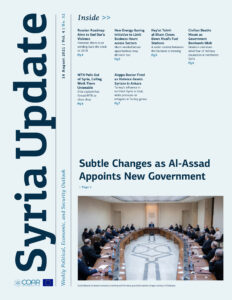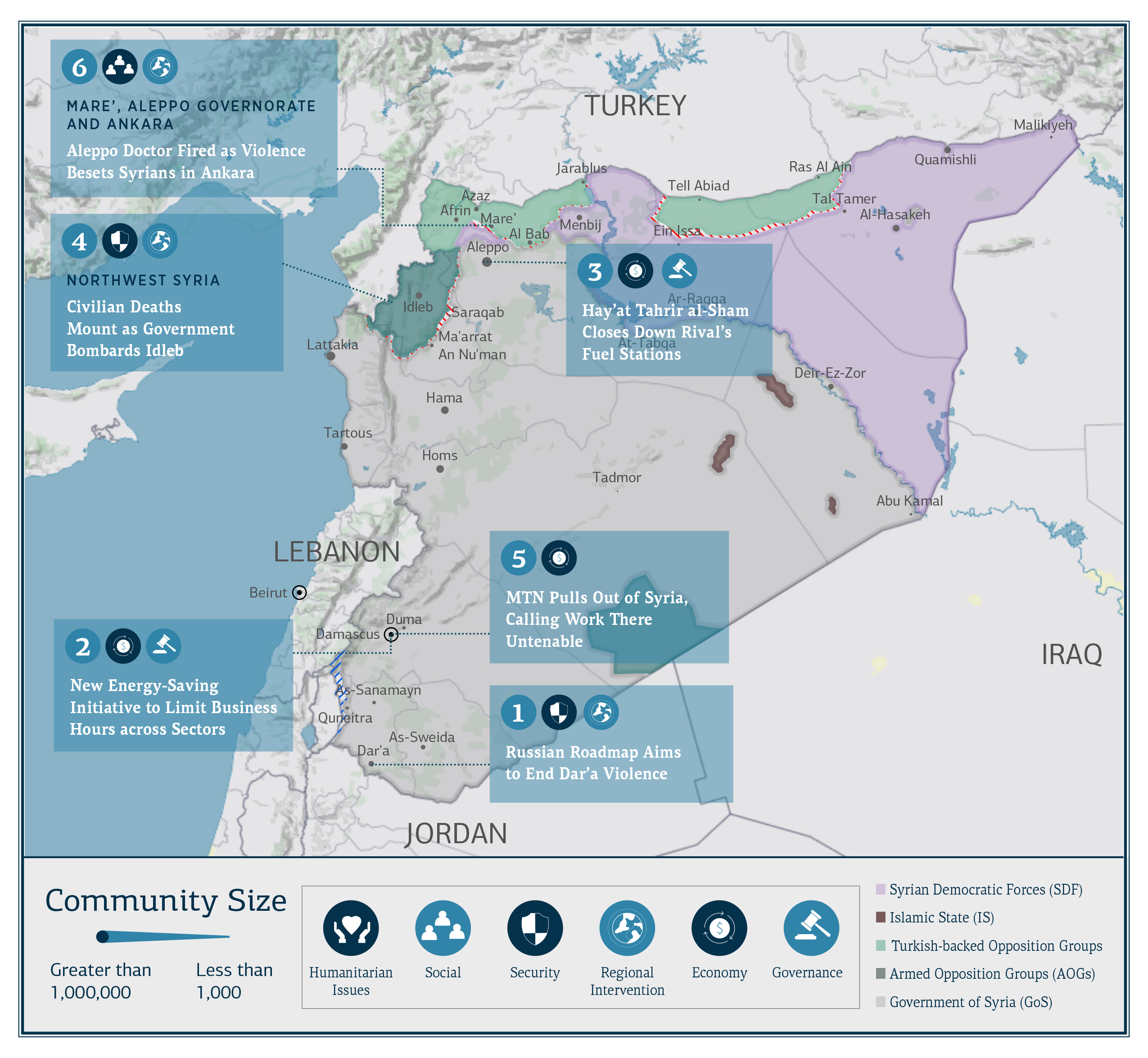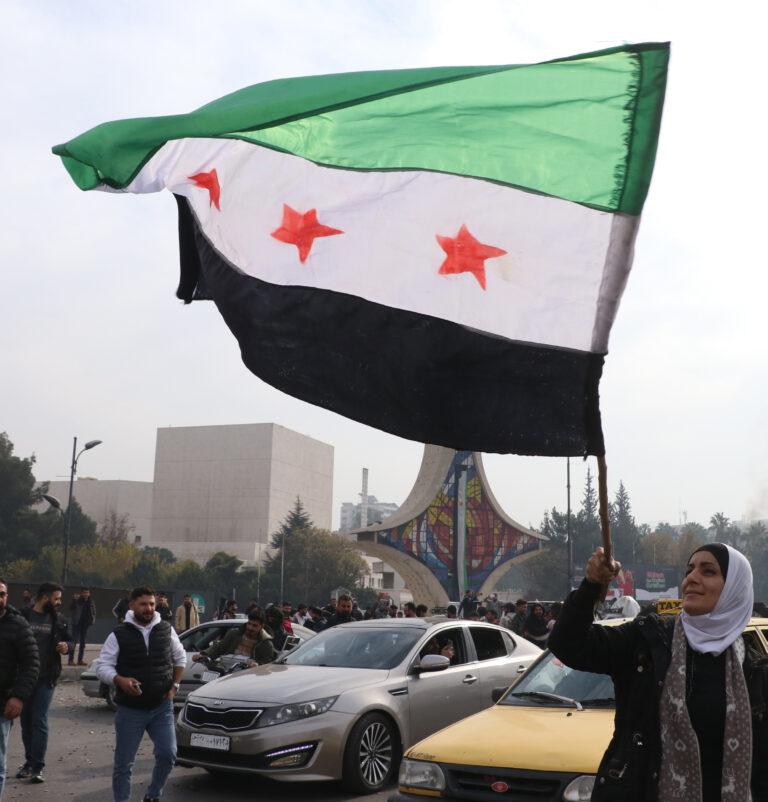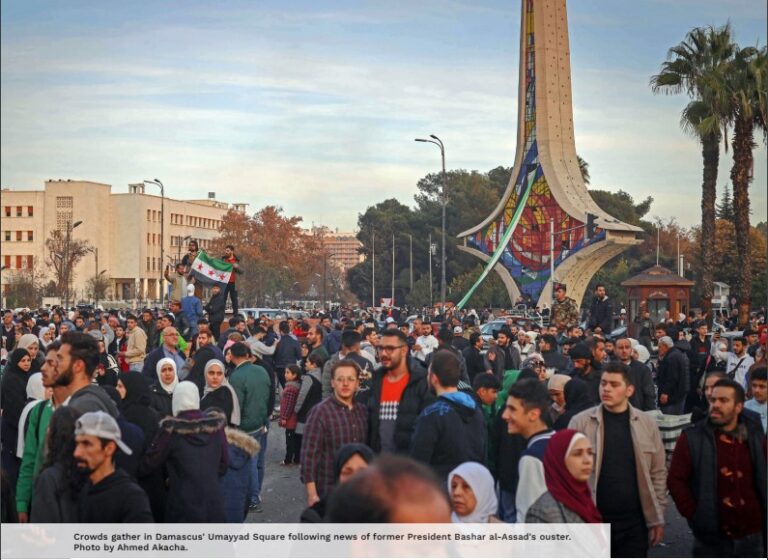In-Depth Analysis
On 10 August, Syrian state media reported that President Bashar al-Assad issued Decree No. 208 (2021), appointing a new cabinet with few changes. Hussein Arnous will remain Prime Minister, and only five new figures will enter the cabinet, which is being formed as a result of al-Assad’s re-election in May to serve a fourth seven-year term in office (see: Syria Update 31 May 2021). Observers have widely dismissed the event as yet another superficial reshuffling of top officials in a foundering state, an action akin to rearranging the deckchairs on the Titanic. However, although the officeholders in the most important posts are unchanged, the subtle developments that have taken place have been widely overlooked.

Meet the new cabinet, (mostly) same as the old cabinet
The cabinet formation has — correctly — been characterised as a largely superficial update. Hussein Arnous remains Prime Minister, and no changes have occurred in the most critical portfolios, such as foreign affairs, defence, interior, and finance. Arnous’s extended term is, for now, a vote of confidence in his handling of the office. He was first appointed Prime Minister in June 2020 following popular protests that erupted in response to economic turmoil and popular demonstrations over the failed policies of his predecessor, Imad Khamis (see: Syria Update 15 June 2020 and Syria in 2021: Forecast for a Protracted Crisis 28 January 2021). Although Syria’s economic turmoil has worsened under his watch — 90 percent of the population is now impoverished — Arnous was nonetheless asked to form a new cabinet earlier this month. He will likely remain in office as long as Syria continues to enjoy the relative currency stability that has set in since the pound rebounded from all-time lows that it hit in mid-May. The 29-member government he has assembled includes three women, and is the sixth to be formed since the outbreak of the uprising in Syria in 2011.
Notable changes have taken place in the composition of the cabinet, however, even if their ultimate significance is not immediately clear. The government includes five new figures, including the Minister of Social Affairs and Labour (MoSAL), the Minister of Domestic Trade and Consumer Protection, and the Minister of Information, in addition to two new ministers of state. Newly appointed as the head of MoSAL is Muhammad Seif al-Din, a lawyer from Damascus. He previously served as assistant to the Minister of Public Works and Housing from 2012 until he was appointed to this cabinet. Although Seif al-Din’s profile and intent are not entirely clear as of this writing, any change to the leadership of MoSAL may alter the operational environment for the aid sector, as the ministry oversees the registration, activities, and potential dissolution of civil society entities and some aid organisations (see: Function Over Form: Rethinking Civil Society in Government-held Syria and LGBTQ+ Syria: Experiences, Challenges, and Priorities for the Aid Sector). For instance, earlier this year, MoSAL promulgated regulations granting NGOs longer fundraising cycles to raise more revenue locally (see: Syria Update 1 February 2020). Such measures suggest a recognition of the importance of a robust aid sector to fill gaps left by the state’s growing incapacity.
Syrian consumers may also hope for changes to state social support and trade. The new head of the Ministry of Domestic Trade and Consumer Protection is Amro Salem, who previously served as Minister of Communication and Technology during al-Assad’s push to modernise Syria’s economy in the mid-2000s. Salem replaces Talal Barazi, who was appointed in May 2020. Barazi was himself elevated to the cabinet in response to popular outrage that culminated in a change of government, and he leaves office as the Syrian populace continues to face challenges accessing basic consumer goods. It is not clear how and why Salem has returned to the Syrian cabinet after a 15 year hiatus. However, he has acquired clout through his active social media presence, including criticisms of the ministry he will now lead.
A ‘stay the course’ cabinet
Although modest changes to state policy are possible, the formation of the new cabinet is not expected to significantly alter material conditions in Syria. Regardless of the composition of the government, al-Assad and his tight inner circle continue to monopolise political power in the country. In the meantime, the destruction of essential infrastructure and the atrophy of the national economy mean that Syrians will continue to face shrinking support from the state. In lieu of robust subsidies and material support, Syrians may well look for their government to serve them best by stepping out of the way and creating conditions that facilitate all-important remittances, aid access, and principled implementation without interference. Whether the new cabinet will facilitate these conditions is unclear, although the nation’s track record is far from encouraging.
Whole of Syria Review

Russian Roadmap Aims to End Dar’a Violence
Dar’a Governorate: On 14 August, local and media sources reported that a Russian delegation has proposed a roadmap to resolve the standoff in Dar’a Governorate during at a meeting including a Government security committee and negotiators from Dar’a. According to these sources, the roadmap stipulates:
- A comprehensive ceasefire;
- The opening of the Damascus-Dar’a al-Balad road;
- Permission for Russian military police to enter all neighbourhoods of Dar’a al-balad;
- The handover of all weapons held by local fighters;
- The establishment of Government of Syria military outposts in restive areas;
- The displacement of 135 persons to northern Syria;
- The organisation of local militias working with Syrian intelligence through official contracts with the Syrian Ministry of Defence; and
- The reopening of the customs post on the border with Jordan.
Although the proposal met with initial agreement and the imposition of a ceasefire across all Dar’a Governorate, local and media sources indicated that Government forces nonetheless continue to target Dar’a al-Balad and farms in western Dar’a via mortars and medium machine guns. In addition, the 4th Division repeatedly closed al-Saraya checkpoint between Dar’a al-Balad and Dar’a al-Mahata, and opened fire as civilians attempted to leave Dar’a al-Balad. Notably, these developments follow the unusual — and apparently ineffective — mediation of UN Special Envoy to Syria Geir Pedersen, who spoke with the Central Negotiations Committee in Dar’a al-Balad via a Zoom call on 10 August. They discussed the military escalation in Dar’a Governorate and the siege conditions imposed on Dar’a al-Balad. The Central Committee placed on the United Nations the burden of lifting the siege and obliging Government forces and their allies to maintain the terms of the 2018 reconciliation agreement. Pedersen reportedly promised to take the Central Committee’s demands to the United Nations Security Council.
No return to the 2018 reconciliation deal’s terms
The roadmap has been framed as an attempt to restore Russia’s role as guarantor of the 2018 southern reconciliation agreement (see: Intermediaries of Return), yet Moscow’s posturing is unlikely to have the impact former opposition fighters in Dar’a al-Balad desire. A comprehensive solution along the lines of the 2018 reconciliation agreement is no longer feasible, and a return to that status quo is inimical to the demands levied by Damascus. Indeed, the relative autonomy that made the agreement favourable for former rebels in southern Syria will be all-but eradicated by the terms now proposed in the Russian roadmap. This roadmap broadly fulfills the Government of Syria’s own demands for access and the disarmament of former opposition fighters, their subordination, and their direct remobilisation under its own command.
The latest statements by external actors condemning the military escalation in Dar’a and the unusual meeting of the special envoy with the local negotiators indicates that the international community remains interested in resolving the standoff in southern Syria, which is enmeshed in the geopolitics of neighbouring states Jordan and Israel. However, there is little that can be done, and calls to support the former opposition against Damascus leave little room for practical recommendations. While Jordan remains interested in re-opening the border crossing, much of the international community is fixated above all on Iran’s presence near the border with Israel.
Looking ahead, the stipulations concerning the surrender of arms and displacement will, if carried out, neutralise anti-Government actors in southern Syria. In theory, Russia is seeking to impose itself as the most powerful force in southern Syria, and present itself as the implementer of internal solutions to the Syrian crisis by securing consensus among local parties. In practice, it has not been able to establish trust between communities and Government forces, and has even lost its key role as guarantor of the 2018 agreement. While conditions in the south are always subject to rapid change, it appears that the region is on the path toward tighter effective control by Damascus. Until definitive terms are imposed, violent escalation remains possible. In addition, crisis response actors should remain attentive to evolving access conditions and potential changes in checkpoints, and the role of de facto local authorities.
New Energy-Saving Initiative to Limit Business Hours across Sectors
Damascus: In an attempt to reduce energy consumption and regulate working hours across Syria, on 7 August, Damascus Governorate issued an order stipulating specific opening and closing times for all commercial markets, shops, restaurants, and various economic activities in the governorate. The ruling, first implemented on 9 August, empowers the Damascus Governorate Police Department to conduct daily rounds and carry out inspections in search of violators. Punishments range from warnings to sealed closures if repeated violations are encountered, in addition to fines of 30,000 SYP (9.02 USD). According to Mazen Hassan, a member of the Board of Directors of the Damascus Chamber of Commerce, the initiative aims to save energy to be redirected to residential users. Lattakia, Aleppo, and Rural Damascus governorates are expected to follow suit.
Lights out
Adverse labour conditions defined by long working hours and recurrent electricity shortages are two of Syria’s most wide-reaching popular concerns; rather than tackling either, the new measures threaten to exacerbate both. Limiting operating hours will reduce income opportunities in an already tight labour market. Diverting power for residential use, as suggested, is a risky form of triage that risks undermining overall economic activity. As expected, this decision has and will continue to leave workers and shop owners frustrated. Among other grievances aired by shop owners, is concern over the impact on stores providing services to customers who shop late at night, a necessity given long working hours for many Syrians.
Taking these frustrations into account, regulations over opening and closing hours will be beneficial only if the power supply is consistent during the limited working hours that are allotted. If stable power provision remains elusive, as is likely, hardships will only escalate. Shop owners have already been forced to close due to chronic power outages. In June 2020, for example, the head of the Sweets and Ice Cream Association in Damascus explained that 10 ice cream shops were closed due to continuous power cuts. Conditions have only worsened since then. Moreover, well-connected and well-heeled owners are likely to violate the new restrictions. Already, reports indicate that kiosks have begun to pay bribes to security patrols in exchange for permission to work outside designated hours. If business opportunities become subject to a pay-to-play scheme reliant on bribery, the fallout will land most heavily among already struggling businesses, and the rule of law in Syria will be further undermined.
Hay’at Tahrir al-Sham Closes Down Rival’s Fuel Stations
Ghazawiyet, Aleppo: On 11 August, media sources reported that Hay’at Tahrir al-Sham (HTS) closed down gas stations near the Ghazawiyet crossing, which separates HTS- from Free Syrian Army-controlled areas in the western Aleppo countryside. HTS justified its actions by claiming that the owners of these gas stations were Sham Legion operatives and that they were unlicensed by the Salvation Government. The Sham Legion is a Turkish-backed militia operating in northern Syria, and is considered a rival to HTS. Locals have claimed that the station owners are civilians and that HTS shuttered their operations because they are not affiliated with the Watad company, which has monopolised fuel sales in Idleb (see: Syria Update 7 December 2020). Notably, it was reported that these stations’ prices were lower than the 350-375 Syrian pounds charged per litre by the Watad company, although the exact price has not been confirmed. Meanwhile, local sources have confirmed that HTS closed down stations not owned by the Watad company.
Economic warfare
HTS has consolidated its economic grip over Idleb and western rural Aleppo as a natural consequence of its military dominance and long-term state-building prerogatives for the region (see: Syria Update 27 July 2020). However, in the long term, HTS’s governing model impedes its aim to be viewed by the international community as an acceptable interlocutor, and it hampers its efforts to make inroads among civilians as a credible and just alternative to the Syrian Government. The latest incidents also highlight recently surfacing concern that tensions could build between the Sham Legion and HTS. For the time being, however, it is unlikely that a major confrontation will take place. The Sham Legion receives direct support from Turkey, which is unlikely to condone any large-scale conflict between the Legion and HTS. Such a conflict would create even more instability in the region — an outcome which Turkey is keen to avoid.
Civilian Deaths Mount as Government Bombards Idleb
Northwest Syria: Civilian casualties continue to mount as the Syrian Government and its allies pummel the so-called “de-escalation” area in northwest Syria via airstrikes and artillery bombardment. On 8 August, Syrian Civil Defence announced that four children were killed while five others sustained critical injuries during heavy bombardments in Qastun in the western countryside of Hama Governorate. On 10 August, media sources reported that Russian warplanes had launched 11 airstrikes, eight on the town of Shekh Bahr, and three on Balshun in Idleb’s northwest countryside. In addition, Government of Syria forces targeted Jabal al-Zawiya with intense artillery shelling and rocket fire, causing an unknown number of casualties. The Syrian Observatory for Human Rights indicated that two children were killed and others injured due to bombardments by the Syrian Government in Aleppo Governorate’s southwest countryside.
On 10 August, UNICEF announced that around 45 children have been killed in northern Syria since July, and demanded all parties stop the violence and protect children.
No safe harbour
Continued targeting of the de-escalation zones in northwest Syria by Government forces and their allies has become a grim feature of the “new normal” in the region. It is notable that the bombardment in recent weeks has heavily impacted localities outside the Government of Syria’s main area of strategic interest, Jabal al-Zawiya (see: Syria Update 9 August 2021). Nonetheless, there are few if any concrete indicators that a large-scale military operation is now in the works in Idleb. For the time being, main concerns revolve around the bombardment of infrastructure and heavily populated civilian areas, which will pose a continuing risk to affected communities (see: Syria Update 29 March 2021). There is a narrative among Syrians that Government bombardment of northwest Syria is being carried out to distract from economic privation in Government areas and prevent the opposition-held region from embarking on a sustainable trajectory.
As long as artillery shellings, rocket attacks, and airstrikes continue in northwest Syria, the region will remain in limbo. Increased displacement is possible, although typical places of refuge are already heavily burdened. If medical facilities continue to be targeted, there is a risk that those in Idleb will face greater pressure to seek refuge in Turkey, where major tensions are surfacing over refugees. Any waves of displacement may prompt Ankara to place additional pressure on the EU for support (see: below).
MTN Pulls Out of Syria, Calling Work There Untenable
Damascus: On 12 August, media sources reported that the South African telecommunications provider MTN has decided to leave Syria, citing “untenable” business conditions. Meanwhile, the Government of Syria announced the signing of three contracts for the privatisation of state factories producing sugar and cement. The contracts were awarded to Al-Maseer Trading LLC (sugar production), and Nabd Contracting and Construction LLC (cement). The latter is affiliated with the powerful Katerji Group, which has sought to expand its investments in the cement industry since 2019, and plans to increase the annual production capacity of Nabd Contracting and Construction to 1.1 million tonnes of Portland cement.
Elite capture of vital sectors
These developments evidence the further consolidation and elite capture that define Syria’s wartime business climate. MTN’s withdrawal from Syria is the culmination of years of fraught back-and-forth with Damascus authorities regarding the group’s finances and taxes. Pressure on the firm grew as business mogul Rami Makhlouf was systematically stripped of his business interests, including a controlling stake in rival telecom firm Syriatel (see: Syria Update 8 March 2021). Telecommunications is among the most profitable sectors in Syria, making it a target of elite capture, as evidenced by First Lady Asma al-Assad’s interest in the sector. Similar dynamics are at play in the latest privatisation of Syrian factories. Of particular note is the involvement of the Katerji Group, which is notorious for its involvement in the cross-line fuel trade and its sanctioned principals, including targeting for sanctions. Members of the family have been sanctioned for doing business and openly supporting the Syrian Government. Their involvement in cement raises a reputational, legal, and operational risk for aid sector supply chains, and indicates the firm’s interest in capitalising on one of Syria’s anticipated post-war boom sectors: reconstruction. Heightened due diligence practices for activities in sensitive sectors including heavy construction materials are advisable.
Aleppo Doctor Fired as Violence Besets Syrians in Ankara
Mare’, Aleppo Governorate and Ankara: On 8 August, media sources reported that Syrian doctor Othman Hajjawi was dismissed from his post in the Mare’ hospital, a Turkish-supported hospital in northern Aleppo. Reportedly, he was fired based on the decision of the Turkish chief of doctors in the state of Kilis. While the official reason given for the dismissal is that Hajjawi mistreated patients and was not on time for his shifts, Syrians in the country and abroad have been outspoken in their criticism of the move, and many contend that the real reason for the dismissal was his criticism of a Turkish nurse at the same hospital and his submission of a complaint against the nurse. The Free Aleppo Doctors Syndicate condemned the decision to dismiss Hajjawi, stating that there is no legal or administrative basis to do so, adding that the accusations against him are baseless and false.
Meanwhile, On 12 August, media sources reported that Turkish citizens took to looting Syrian shops in Ankara after a dispute between Syrian and Turkish youths led to the death of a Turkish citizen. Anti-migrant tensions flared after news of the incident spread, and many Turks took to the streets and overturned cars and ransacked shops in a violent display of nativist sentiment. According to the media, Turkish authorities arrested 76 people involved in the riots, as well as people who instigated and encouraged it on social media.
Turkey’s way, or the highway
The incidents cast attention on the tenuous status quo in northern Syria and mounting pressures facing refugee communities in Turkey. Syrians have widely interpreted Hajjawi’s dismissal as punishment for his outspoken criticisms of Turkey’s intervention in Syria, in addition to being a response to his apparently fractious workplace relationship with a Turkish nurse. The firing demonstrates Turkey’s controlling influence over civic affairs and service provision in northern Syria, which is deeply integrated into the administrative, civil, and military structures of corresponding regions of Turkey (see: Needs Oriented Strategic Area Profile). Meanwhile, the public outburst of violence targeting Syrians in Turkey is a worrying sign of the pressure now building against refugees in the country, particularly Syrians. Refugee issues are bound up with Turkish national politics, with current leadership and opposition parties each vying to position themselves so as to capitalise on rising nativist sentiment (see: Syria Update 2 August 2021). Turkey’s leaders are increasingly likely to seek leverage with Europe over migrants as they themselves face growing political pressures to take decisive action concerning refugees.
Open-Source Annex
Key Readings
The Open Source Annex highlights key media reports, research, and primary documents that are not examined in the Syria Update. For a continuously updated collection of such records, searchable by geography, theme, and conflict actor, and curated to meet the needs of decision-makers, please see COAR’s comprehensive online search platform, Alexandrina, at the link below..
Note: These records are solely the responsibility of their creators. COAR does not necessarily endorse — or confirm — the viewpoints expressed by these sources.
Iraqi Forces Backed by Iran Want To Emulate What Afghan Militias Did To The Americans in Afghanistan
What Does it Say? Iranian-backed militia are gaining momentum as a result of the U.S.’s withdrawal from Afghanistan.
Reading Between the Lines: The withdrawal has emboldened their belief that they are capable of expelling the Americans from the Iraq-Syria border.
Russia’s new twist in Syria policy: Restore archaeological sites
What Does it Say? Russia has begun to restore several historical sites in Syria.
Reading Between the Lines: Russia hopes that by doing this, it will burnish its credentials as a protector of cultural heritage rather than a conquering force. While cultural preservation is an important and overlooked area of activity in Syria, it is, like others, open to politicisation and manipulation.
A Comprehensive Review of the Effectiveness of US and EU Sanctions on Syria
What Does it Say? The report studies and analyses the effectiveness of Western sanctions on Syria.
Reading Between the Lines: The sanctions have yet to produce any meaningful behavioural change in Syria. In reality, the most significant result of the sanctions is civilian suffering. This study, like others, proposes incremental sanctions relief in a bid to more effectively leverage the pressure they generate.
The Autonomous Administration of North and East Syria opens an office in Switzerland
What Does it Say? The Autonomous Administration has opened an office in Geneva, Switzerland.
Reading Between the Lines: The Autonomous Administration has been vying for international recognition as an autonomous political body within Syria for years. While this may be a step in that direction, many key donors remain reluctant to engage the entity directly, a position that will become more difficult to sustain the longer relations with Damascus remain frozen.
Biden must heed Russia’s latest threat to US forces in Syria
What Does it Say? Russia has revived an often-raised complaint that U.S. forces must vacate Syria, as their presence is a violation of UN Security Council Resolution 2254.
Reading Between the Lines: A U.S. withdrawal would make Russia’s efforts to shape Syria’s political future significantly easier, although Moscow is now likely more interested in public relations victories than in actually expelling U.S. forces, a prospect that has diminished since Joe Biden took office.





